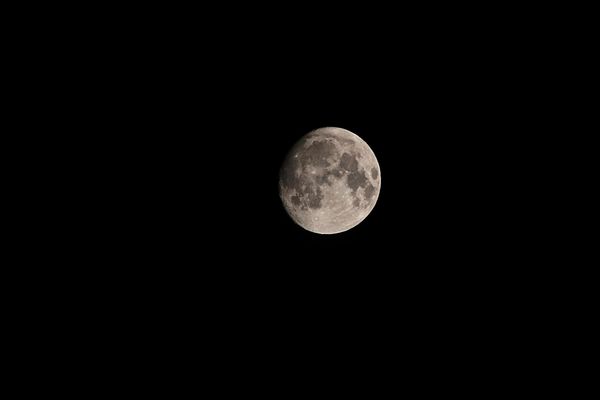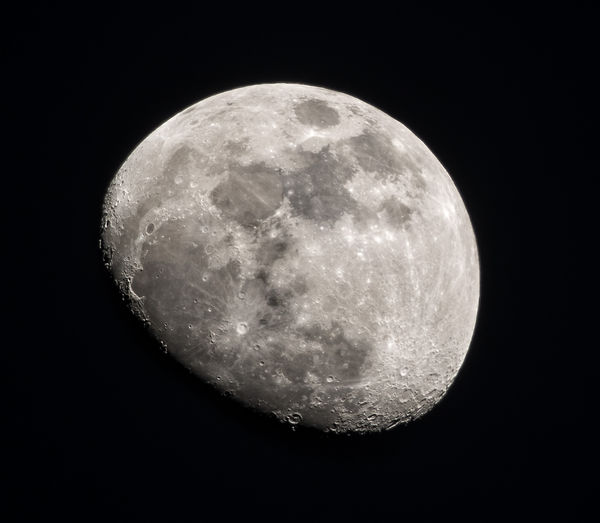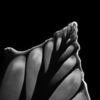Advice on Shooting Lunar Eclipse
Apr 12, 2014 16:26:19 #
OK, I am going to try and shoot the lunar eclipse Monday night. I have read and watched links from archived discussions but I could still use a little advice. I will be ready from home in Utah with my Nikon D7000, 55-300mm zoom, sturdy tripod and pellet gun to dim offending street light (just joking on that last one. Hmm, wonder if I could get my wife to shimmy up pole and hang a couple of dark trash bags over the light). Anyway, at this point I am thinking ISO 400, f 5.6 but would appreciate suggestions on shutter speed before, during, and after total eclipse. On internet I have heard anything from 1/500 before and 1/2 to 30 seconds during totality. Any advice would be helpful. What a great site this is!!
Apr 12, 2014 16:43:37 #
I'd use a lower ISO than that (to keep noise down, assuming you're using a remote shutter).
And just experiment with shutter speed - one of the advantages of digital is, we can see immediately how the exposure is, and adjust accordingly. (You'll need a much faster shutter speed than you think or the camera meter tells you, as long as the moon is illuminated, so that the illuminated part isn't blown out.)
Here's what I got last time - on a partially foggy night, so these aren't as sharp as I'd like (but I couldn't do anything about the fog):
http://allenh.zenfolio.com/p89673159
And just experiment with shutter speed - one of the advantages of digital is, we can see immediately how the exposure is, and adjust accordingly. (You'll need a much faster shutter speed than you think or the camera meter tells you, as long as the moon is illuminated, so that the illuminated part isn't blown out.)
Here's what I got last time - on a partially foggy night, so these aren't as sharp as I'd like (but I couldn't do anything about the fog):
http://allenh.zenfolio.com/p89673159
Apr 12, 2014 16:50:19 #
I think you're going to have to experiment a lot with settings, which is completely OK because it's a nice, slow, long drawn-out event. I got a fairly decent shot when the winter solstice coincided with a lunar eclipse, f/4.0 at ISO 1000, 0.4 sec, but had a shoddy tripod and wasn't shooting with a remote cable release. If your camera has "live view" it will go a great distance in setting your camera, but even better, will allow you to get the sharpest focus.
Apr 13, 2014 02:22:59 #
Lowest iso you've got White balance set on Daylight (its the picture of the sun) I generally shoot at a F/10 or higher shutter speed around 1/100th of a second on a tripod is best. I'm hoping the weather holds here!! we were overcast during the last lunar eclipse😒
Tonights moon...Not as sharp as I like, I was being lazy about busting the tripod out and went handheld

Apr 13, 2014 02:24:43 #
Apr 13, 2014 05:45:19 #
nervous2 wrote:
OK, I am going to try and shoot the lunar eclipse ... (show quote)
You will probably be looking to get an image like this, but you won't. This was at ISO 100, F4, 1/160 sec processed in Lightroom 5, then in OnOne Perfect Photo Suite to bring out some detail and contrast in the top right. I used a tack sharp 600mm F4, on a sturdy tripod with an Arca-Swiss head and used live view to establish focus.
The 300mm setting on your lens is soft, even at its sharpest at F8. If you are ok with that, you will likely need to boost your ISO considerably to get the glow of the moon when it is completely obscured.
Good long lens technique is to drape your arm over the lens and press your forehead against the camera, and roll your finger on the shutter release. Your biggest threat to stability is mirror slap and shutter movement between 1/30 and 1/125 sec, and using remote release, mirror lockup will only partially alleviate the vibration issue.
Leave your home (and streetlights) and find a spot where there is none of this. I am sure you wouldn't have to travel too far to find a suitable situation.
Apr 13, 2014 06:32:21 #
MARTYIV
Loc: On the Wabash
Allen: Great shots. May I ask what Lens you used? I'm guessing 200 to 300 mm.
Apr 13, 2014 07:51:43 #
nervous2 wrote:
OK, I am going to try and shoot the lunar eclipse ... (show quote)
Don't be fooled into thinking that the exposure you find acceptable of the moon during "normal" times will be close to the exposure during a full lunar eclipse. You will need a much longer exposure time. With a focal length of 400mm, you will still need to crop your image considerably. And at an aperture of f5.6, even with a very steady tripod, you will find that the moon moves enough to blur the image during exposure times longer than 0.5 seconds. So, the trade off is higher ISO with more noise or motion blur with less noise.
Apr 13, 2014 08:07:35 #
DavidT wrote:
Don't be fooled into thinking that the exposure yo... (show quote)
:thumbup: :thumbup:
And the longer the effective focal length, the shorter the shutter speed needs to be.
Apr 13, 2014 08:17:43 #
nervous2 wrote:
OK, I am going to try and shoot the lunar eclipse ... (show quote)
I'm planning to set ISO to 100, aperture to f8 and adjust shutter accordingly. I have a 55-300mm that I've used which is soft at 300mm. The hard part is getting up at 2amET and hope for a clear night. Good Luck!
Apr 13, 2014 10:16:34 #
dlmorris
Loc: Loma Linda, Ca
Use full Manuel settings. Then you can set the ISO to whatever you like (400 or so works for me) then adjust shutter speed manually to get the results you want. A couple of years ago, I started with close to 1/1000 of a sec. at the beginning, and during totally was exposing around 4 sec. As someone else pointed out, digital is wonderful in that you can see the results right away and make whatever adjustments you need and shoot again.
Apr 13, 2014 11:30:08 #
As I'm sure all of you know, this will not be a normal eclipse of the moon.
As the photos by Allen Hirsh shows, this will be a Blood Moon or as oftentimes called a Red Moon eclipse. In the past, 300 years passed between Blood Moon eclipses. However, there will be 2 or 3 more happening this year.
Good luck to all of you shooters.
Gordon
As the photos by Allen Hirsh shows, this will be a Blood Moon or as oftentimes called a Red Moon eclipse. In the past, 300 years passed between Blood Moon eclipses. However, there will be 2 or 3 more happening this year.
Good luck to all of you shooters.
Gordon
Apr 13, 2014 12:58:04 #
I have read all the replys on how to shoot the Lunar Eclipse and am learning why I have never got good moon pictures. I have a D7100 which I am not yet familar with and longest lense is a 55 to 300 zoom. The D7100 can shoot in a cropped mode which extends the focal length of the lense by a factor of 1.3. If I understand the focal length, the effective length of the 300 would be 1.5 x 300 = 450. And using the crop mode it would be 450 x 1.3 = 585. Would I be able to get good pictures of the Lunar Eclipse using this setup on tripod and using full manuel with some of the suggested setting in the replys here?
Earl D. House
Sand Springs, OK
Earl D. House
Sand Springs, OK
Apr 13, 2014 13:05:58 #
nervous2 wrote:
OK, I am going to try and shoot the lunar eclipse ... (show quote)
Don't forget no looking directly at the moon without eye protection as the moon can damage your eyes.Seriously 30 seconds is much too long. The Moon is always moving. Don't shoot wide open either (noise) The moon is bighter than you realize. Use live view. Start at f-8 at 250 ISO 20O. Shoot full manual IS off. Experiment before the eclipse and adjust as needed
Apr 13, 2014 13:17:29 #
boberic wrote:
Don't forget no looking directly at the moon without eye protection as the moon can damage your eyes.
:lol:
If you want to reply, then register here. Registration is free and your account is created instantly, so you can post right away.










